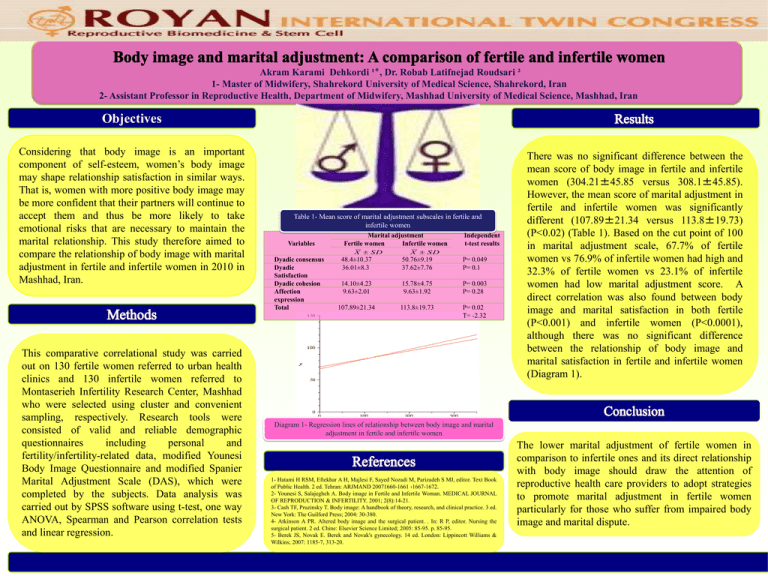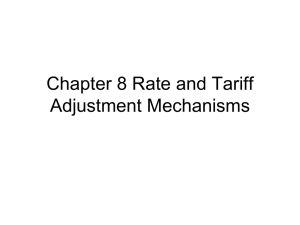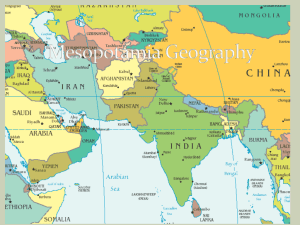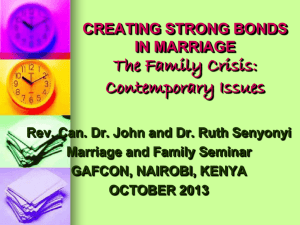Body image and marital adjustment
advertisement

Akram Karami Dehkordi ¹٭, Dr. Robab Latifnejad Roudsari ² 1- Master of Midwifery, Shahrekord University of Medical Science, Shahrekord, Iran 2- Assistant Professor in Reproductive Health, Department of Midwifery, Mashhad University of Medical Science, Mashhad, Iran Objectives Considering that body image is an important component of self-esteem, women’s body image may shape relationship satisfaction in similar ways. That is, women with more positive body image may be more confident that their partners will continue to accept them and thus be more likely to take emotional risks that are necessary to maintain the marital relationship. This study therefore aimed to compare the relationship of body image with marital adjustment in fertile and infertile women in 2010 in Mashhad, Iran. This comparative correlational study was carried out on 130 fertile women referred to urban health clinics and 130 infertile women referred to Montaserieh Infertility Research Center, Mashhad who were selected using cluster and convenient sampling, respectively. Research tools were consisted of valid and reliable demographic questionnaires including personal and fertility/infertility-related data, modified Younesi Body Image Questionnaire and modified Spanier Marital Adjustment Scale (DAS), which were completed by the subjects. Data analysis was carried out by SPSS software using t-test, one way ANOVA, Spearman and Pearson correlation tests and linear regression. Table 1- Mean score of marital adjustment subscales in fertile and infertile women Variables Marital adjustment Fertile women Infertile women X SD Dyadic consensus Dyadic Satisfaction Dyadic cohesion Affection expression Total Independent t-test results X SD 48.4±10.37 36.01±8.3 50.76±9.19 37.62±7.76 P= 0.049 P= 0.1 14.10±4.23 9.63±2.01 15.78±4.75 9.63±1.92 P= 0.003 P= 0.28 107.89±21.34 113.8±19.73 P= 0.02 T= -2.32 There was no significant difference between the mean score of body image in fertile and infertile women (304.21±45.85 versus 308.1±45.85). However, the mean score of marital adjustment in fertile and infertile women was significantly different (107.89±21.34 versus 113.8±19.73) (P<0.02) (Table 1). Based on the cut point of 100 in marital adjustment scale, 67.7% of fertile women vs 76.9% of infertile women had high and 32.3% of fertile women vs 23.1% of infertile women had low marital adjustment score. A direct correlation was also found between body image and marital satisfaction in both fertile (P<0.001) and infertile women (P<0.0001), although there was no significant difference between the relationship of body image and marital satisfaction in fertile and infertile women (Diagram 1). Diagram 1- Regression lines of relationship between body image and marital adjustment in fertile and infertile women 1- Hatami H RSM, Eftekhar A H, Majlesi F, Sayed Nozadi M, Parizadeh S MJ, editor. Text Book of Public Health. 2 ed. Tehran: ARJMAND 20071660-1661 ،1667-1672. 2- Younesi S, Salajegheh A. Body image in Fertile and Infertile Woman. MEDICAL JOURNAL OF REPRODUCTION & INFERTILITY. 2001; 2(8):14-21. 3- Cash TF, Pruzinsky T. Body image: A handbook of theory, research, and clinical practice. 3 ed. New York: The Guilford Press; 2004: 30-380. 4- Atkinson A PR. Altered body image and the surgical patient. . In: R P, editor. Nursing the surgical patient. 2 ed. Chine: Elsevier Science Limited; 2005: 85-95. p. 85-95. 5- Berek JS, Novak E. Berek and Novak's gynecology. 14 ed. London: Lippincott Williams & Wilkins; 2007: 1185-7, 313-20. The lower marital adjustment of fertile women in References comparison to infertile ones and its direct relationship with body image should draw the attention of reproductive health care providers to adopt strategies to promote marital adjustment in fertile women particularly for those who suffer from impaired body image and marital dispute.








